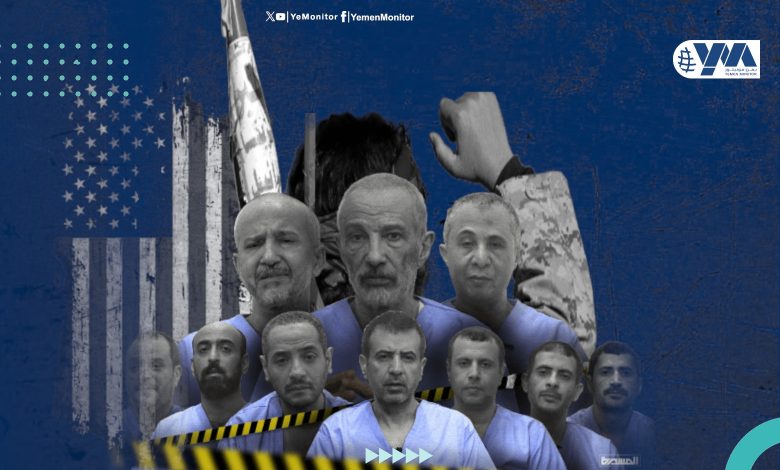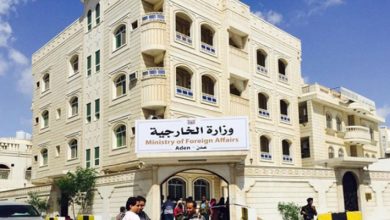
Yemen Monitor/Analysis Unit/Exclusive:
The Houthi group has announced that it has arrested a “US-Israeli spy network,” just days after arresting dozens of UN and US embassy employees. However, a reading of the details of the accusations and confessions distributed by the Houthis and broadcast on the Houthi-affiliated media is a “farce”!
Abdul Hakim al-Khaywani, head of the group’s intelligence department, said in a lengthy statement that the “network” includes former employees of the US embassy in Yemen.
The Houthis said that the spy network was able for decades to influence decision-makers, plant informants, and leak secret reports to the US Central Intelligence Agency (CIA) and the Federal Bureau of Investigation (FBI)!
Al-Masirah TV broadcast video clips of 10 people that it said were confessions of the spy network, adding that it was a small part of the first phase. The group claimed that this cell has been carrying out its roles for decades.
The United Nations has not responded to these allegations. The US State Department has also not yet commented on the Houthi accusations.
In addition to security confessions of working for Mossad and US intelligence agencies, most of the confessions show a strong link between the accusations against the network members and their work either in the US embassy before 2015 or in other international organizations, which we will highlight in this report. This work focused on providing information on “economics, agriculture, politics, education, and civil society organizations”!
Over the past few days, the group’s security and intelligence service has carried out a series of raids and arrested dozens of local and international organization employees working in the country, most of whom work with the United Nations and the US-funded National Democratic Institute, which works in the field of supporting democracy, and employees in a local human rights group.
The Houthis considered what they achieved to be their greatest intelligence achievement so far, but it seems that most of the accusations and confessions related to economics, agriculture, politics, education, and civil society organizations are without any logical basis.
The Houthi group has arrested about 20 Yemeni employees who were working at the US embassy, which suspended operations in Sana’a in 2014, over the past few years.
Economy, Health, and Education
According to the statement, “the spy network provided intelligence agencies with information about the oil, trade, banking, and communications sectors, among others, and monitored economic indicators in various fields to control and strike the economy.”
Economic and vital indicators for any country are usually in open sources used by researchers to know the conditions of countries and their progress in global indicators, and for government members to know the areas in which countries can cooperate and need. Most developing countries – and Third World countries – reveal their development needs and projects in order to obtain assistance, and accepting or rejecting assistance is related to government members and their study of those projects.
The Houthis said that the spy network provided intelligence agencies with information about “the state’s general budget, government plans and policies (successive),” including the Salvation Government (the Houthis’ internationally unrecognized authority).”
It is also published about a defendant who worked in the economic section of the US embassy that he submitted reports on the activities of the Central Bank “and commercial banks operating in Yemen,” and “oil companies operating in the country.”
Among the confessions of the employee at the US embassy, he said that the Americans wanted information about why the “currency printed (by the internationally recognized government) was not traded in the areas of the Sana’a government.” It is strange that this could be an accusation that could harm the security of the group and become dangerous to talk about it!
Most countries in the world publish their general budgets, the activities of central banks, details of companies operating in the country, commercial banks, and the activities of chambers of commerce, and various ministries. Economic and currency changes are an essential part of the work of embassies in countries.
The statement says that the spy network worked “to implement projects and programs in the health field, aimed at destroying the health sector, and contributed to the spread of diseases and epidemics in various Yemeni provinces.” It is not right how projects such as dispensaries and hospitals are implemented, all of which are under the supervision of the Ministry of Health and various state agencies, and doctors and nurses are Yemeni, while at the same time these health programs seek to destroy the health sector and spread epidemics and diseases!
As for the accusations of leading “destructive plans for the educational process and separating education from construction and development” – mentioned in the statement – these accusations are becoming increasingly strange, as the educational system and process have been under the supervision of the successive authorities since the establishment of the Republic of Yemen, and the problem of separating education from economic and development needs is the problem of education in Yemen. The first thing that the armed group should do is to hand over the salaries of teachers that have been stopped for years to restore education in the country and take the future of citizens in their areas of control out of illiteracy, including illiteracy in reading and writing. Every year, there are more than two million students out of school, and those who receive education in areas controlled by the group cannot find teachers and textbooks, in addition to sectarian education and summer centers led by the brother of the group’s leader, Yahya Badreddin al-Houthi.

Political Information and Civil Society
The Houthis present a confession from the former political specialist at the US embassy, in which he says that for 27 years he worked at the behest of the embassy to collect information about “human rights organizations, civil society organizations, and raise it to the US State Department, followed by action to implement programs.”
The activities of civil society organizations are funded by partner organizations – some of which are funded by Western governments – and these organizations and programs defend human rights in the country, support freedom of opinion and expression for citizens, and the armed Houthi group has benefited since its inception – until their control of Sana’a – from the activities of these organizations and defend their detainees in the prisons of the successive authorities. The group also benefited after the war from the activities of these organizations outside the country to present their point of view, and follow up on what they believe are violations against them by the authorities of other countries, or civilian victims of the air strikes; It is already funded by Western governments or by partner organizations! Most of the human rights activists in the armed group have benefited – and still do – from these programs!
This employee presented what was described as confessions that he “collected information about how political parties work, how the parliament works, and the elections that were taking place”! In addition to being an essential part of the work of embassies, this information is also open source and not classified information that must be treated with caution! All countries that are considered democratic – including Yemen – publish this information and even governments provide it to embassies!
Agricultural Sector
The statement published by the Houthis added that the spy network “implemented American plans in the agricultural sector (..) the most prominent of which are the production and breeding of agricultural pests, and the pursuit of striking local production; by passing policies that discourage farmers, and are tempting to import animal and agricultural products from foreign markets.”
An employee who worked in the US embassy and the United Nations and USAID for 34 years presents confessions, including that while working in the 1990s in the National Environment Program (government) funded by the United Nations: he worked on destroying the soil and destroying water barriers!
He indicates that he “was recruited by US intelligence in the fruit propagation department”! And he confesses that he worked on “spreading vice and immorality, strengthening the mixing of men and women, and between male and female students in the field of management in Al- Mahwit Governorate and Aden Governorate”!
The employee added that he also worked in USAID to spread “highly toxic pesticides, spread pesticides and agricultural pests in Yemen, transfer animal diseases and pests, and had an impact on bees (honeybees)”!
This confession and statement treat Yemen as if it has no state, no successive governments, and no agricultural programs, and as if all Yemenis are responsible government officials and farmers who do not know their country or the agriculture they have relied on for thousands of years. And with the projects funded by international agencies at the request and supervision of the Yemeni governments and authorities, as if they were pure evil, and that the officials are selling their country in exchange for these projects!
American Evaluation
The Houthis published what they said was the American “evaluation” of the “spies,” referring to the evaluation of the local employee, which all countries in the world rely on in evaluating their employees, whether they were local or citizens in embassies or in governments, even private companies and institutions do so to know the evaluation of their employees.
It seems that the Houthis obtained these evaluations when they took over the US embassy. Perhaps the Americans did not find a convincing reason to destroy them!
Among these evaluations:
” It is fair to say that without his help, the US government was blind to events on the ground related to the Yemeni economy”.
“His contributions provided politicians with information for appointments”.
Evaluation of another employee:
“He was the pillar of the political and economic section of the embassy in Sana’a, and I cannot describe the importance of Abdulqadir to the embassy and US foreign policy regarding Yemen!”
Another evaluation:
” He was awarded the Best Local Employee of the US Embassy for the year 2012.”
Most of the evaluations mentioned refer to reports and work of the embassy and the US State Department’s benefit from them in knowing Yemen’s affairs, which is a normal routine procedure within diplomatic management on the basis of which promotion is obtained within the framework of the profession or dismissal.
This report provides a picture of how the Houthis use the legitimate jobs and work of Yemenis as a tool to pressure their opponents, whether they are local parties and entities or governments.
Tensions have escalated between the Houthis and the US since the US and Britain began airstrikes on their sites in the Yemeni countryside in response to Houthi attacks in the Red Sea. Tensions have also increased between the armed group and UN agencies since the international organization stopped its relief and development projects in Houthi areas a year ago, and the failure of negotiations between the two parties to return them.




